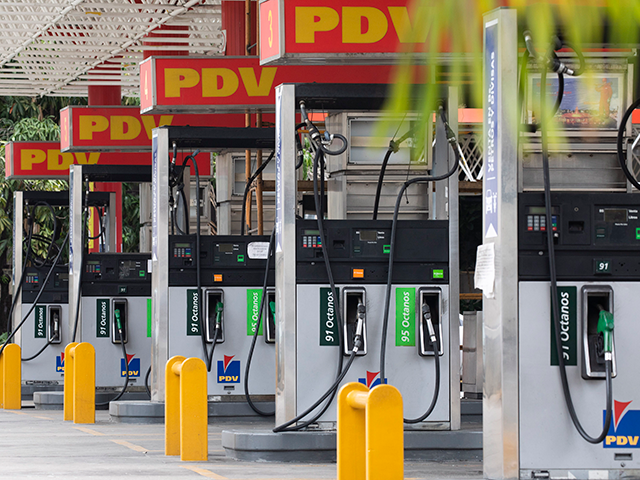Venezuelan dictator Nicolás Maduro claimed on Wednesday that his country had just under three weeks’ worth of gasoline left, blaming the shortages on a supposed terrorist attack against an oil refinery in Falcón state.
“Venezuela at this moment only has gasoline reserves for the next 20 days,” Maduro said during a press conference. “We have managed to accumulate some and are hoping to extend this to 30 days. These gasoline reserves have been achieved as a result of the fact that we are producing 30 more than the country’s consumption and that gasoline imports have arrived from various regions.”
According to Maduro, the shortage of fuel was the result of a “terrorist attack” at the Amuay refinery in Falcón state after there was an explosion at the facility on Tuesday afternoon.
“Yesterday, the Amuay refinery was attacked with a powerful weapon,” he declared. “They wanted to cause total destruction of the refinery. They demolished a tower with a level of thickness in its steel superior to a war tank.”
Maduro did not present any evidence for his claim or further description of the alleged “weapon.” He also did not accuse anyone of staging the alleged terrorist attack. Maduro typically blames most ills in his country on the Trump administration and the United States, which have led efforts to remove his regime from power by imposing severe economic sanctions on the country’s oil industry.
National Assembly member Luis Stefanelli Barjacoba contended that the incident was most likely caused by a “hydrofluoric acid leak.” He also accused the state-run oil company Petroleum of Venezuela (PDSVA) of an “irresponsible attitude in failing to contest Maduro’s questionable version of events.”
PELIGRO Amuay vuelve a ser escenario de alerta máxima, con la actitud irresponsable de PDVSA que ha mantenido cosetudinariamente desde la tragedia de Amuay…abro hilo pic.twitter.com/XpCT97vV8m
— Luis Stefanelli (@LuisStefanelli) October 28, 2020
“We are returning to normal from a very hard blow,” Maduro claimed. “The United States has for a year tried to block the gasoline that we are importing. Even in August, they stole three million barrels from us at sea, with the help of [opposition leader] Juan Guaidó.”
Even as Venezuela’s economic and humanitarian situation reached dire proportions in recent years, most people could access gasoline practically for free as part of the socialist regime’s gas subsidies first introduced under Hugo Chávez. Despite having the largest oil reserves in the world, oil production has plummeted in recent years as employees resigned en masse from PDSVA. Replaced by socialist cronies with little functional engineering experience, PDVSA’s oil refineries have fallen into such decay as to render them largely inoperable.
As a result, the crisis-stricken country has for the past two years experienced chronic shortages and removal of subsidies that have made gasoline unaffordable for most people. Those who can afford it are often forced to wait for hours or even days in queues as motorists desperately try to access what has become the most precious of resources.
Should Venezuela run out of gasoline entirely, this would likely lead to the most severe situation ever experienced there, as there would be no available transportation for people, food, medical supplies, and just about every other living essential. Even with access to gasoline, the average Venezuelan is now living off just a few dollars a month and remains unable to provide sufficient food, shelter, and basic living standards for their family.
Follow Ben Kew on Parler, Facebook, or Twitter. You can email him at bkew@breitbart.com.

COMMENTS
Please let us know if you're having issues with commenting.